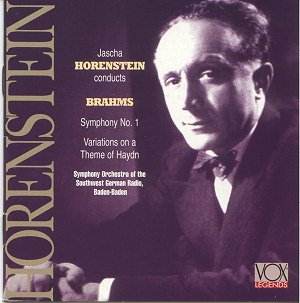BRAHMS:
Symphony No.1 in C minor
Variations on a Theme of Haydn
 Symphony Orchestra of Southwest
German Radio, Baden-Baden.
Symphony Orchestra of Southwest
German Radio, Baden-Baden.
Conducted by Jascha Horenstein
 (Recordings from 1958) Vox
Legends Vox
7801
(Recordings from 1958) Vox
Legends Vox
7801
Amazon
USA midprice

Few apologies need to be made for the sound quality on these two performances
from the end of Horenstein's series for Vox in the 1950s. In fact that of
the First Symphony almost rivals the sound given him in a later recording
of the work made originally for Readers Digest with the LSO. For a long time
a leading contender in the choice for this cornerstone work when it was released
on an RCA LP. It is certainly a work Horenstein had a high regard for and
his interpretation emerges with every aspect covered in a wonderfully coherent,
classically argued view. The timps produce a well-integrated tread in the
introduction rather than battering us into submission like some versions.
Here the drums are made to be another colour in the mix, a familiar Horenstein
fingerprint. As so often, he knows how to marshal his forces, when to keep
some in reserve, when to unleash them. In fact it's the strings that deliver
the tragic message at the start and they stay in our minds for far longer.
The main exposition that follows is as good an illustration of another major
characteristic of Horenstein's style as you could wish to hear. As so often,
he has chosen a tempo that will unerringly seem to suit the whole span of
the movement and he will stick to it, varying only slightly and occasionally
when the composer demands and never when the whim takes him. The development
that emerges thus seems to possess a tensile strength and also wholeness
in the way Horenstein doesn't neglect the middle registers with the double
bassoon especially rich.
A noble restraint hangs across both middle movements. There is some fine
solo horn playing to the fore at the start of the third and a very chaste
oboe in the second. Some may miss the more tragic grandeur someone like
Furtwangler brings to the slow movement in particular, some may prefer the
refinements of Karajan, but Horenstein's blend of romantic warmth and classical
strength has its place. He then builds the introduction to the fourth movement
most carefully and steadily in a series of graded steps so the arrival of
the great horn solo seems a goal inevitably won rather than forced on us
as it sometimes can. Notice how Horenstein keeps his timpanist under control
here too. What he seems to want is not a percussive noise but a very musical
sound to add to the mood he is trying to convey. Note again the special attention
that is paid to the double bassoon. The peaks of this movement are delivered
with splendid drama that is more impressive for the care with which they
are built to. As so often with this conductor's recordings, don't expect
to be bowled over on first hearing. Horenstein's recordings invariably need
time to be made aware of their rightness.
The Haydn Variations that complete this disc are notable for their elegance
and charm with Horenstein showing a lovely feel for the melody of the main
theme itself. The stereo recording is like that of the symphony, full and
well balanced with some especially good woodwind solos well caught. The short
fifth and sixth variations are both marked Vivace but I admire Horenstein's
very mordant readings of these - powerful without sacrificing propulsion.
Then the Grazioso of Variation Seven sees some beautifully long-phrased strings,
so typical of this conductor who must have rehearsed them especially to produce
this glorious effect. This performance is a real pleasure from start to finish.
In fact the whole disc is a gem that I cannot recommend too highly. Sound-wise
it has a few problems but no more than many recordings from the late 1950s
have and the remastering has come out superbly.
Reviewer
Tony Duggan
Performances:

Recordings:

